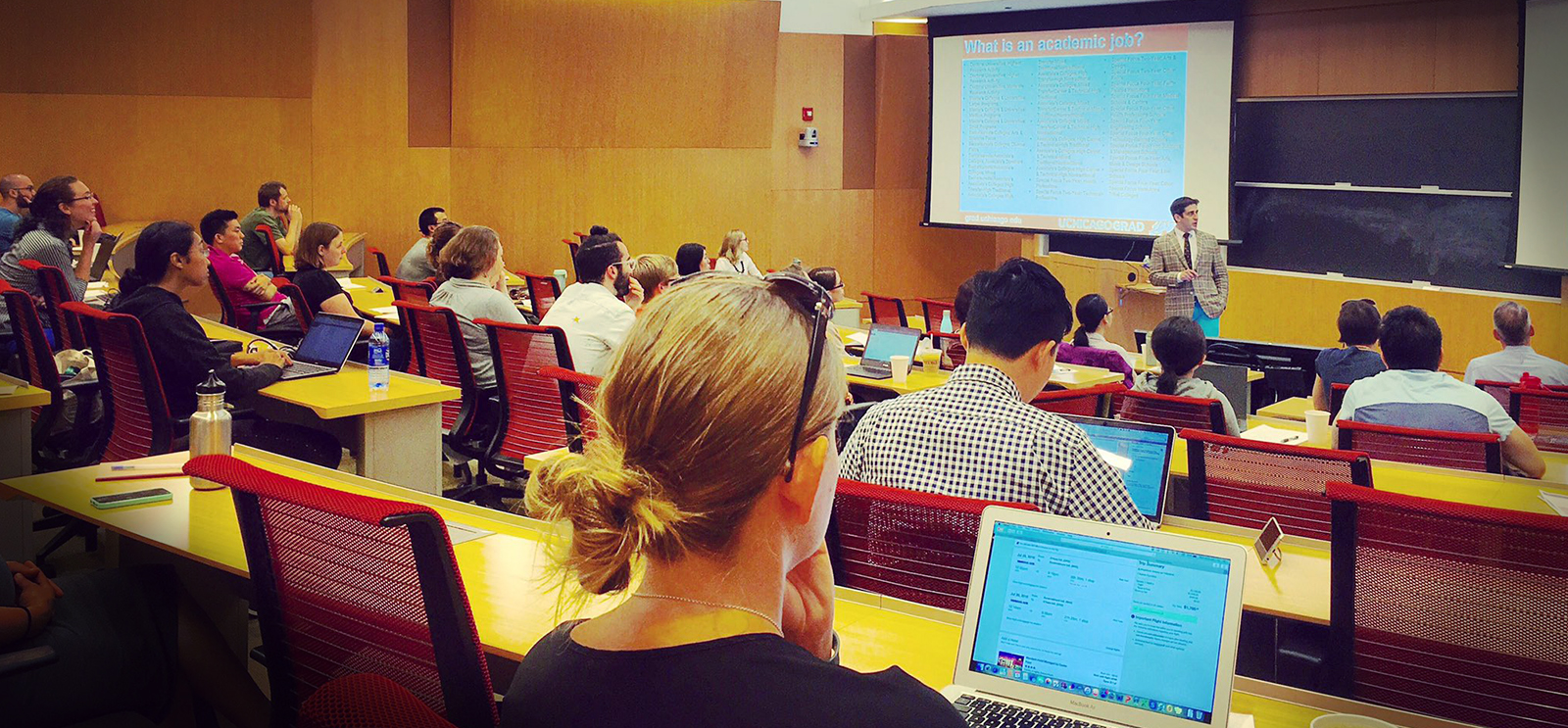
(Photo courtesy UChicagoGRAD)
UChicagoGRAD gives graduate students the skills they need to succeed wherever their careers take them, from the classroom to the boardroom, writes executive vice provost Sian Beilock.
Scroll through the daily headlines of most news sites these days, and you are almost sure to find a story on higher education—mostly the undergraduate four-year degree. But what about graduate education? At the University of Chicago, we have a long history of graduate education, reaching back to the earliest days when President William Rainey Harper placed an emphasis on creating excellent graduate schools. Today we have a renewed focus on ensuring that our graduate students and postdoctoral researchers receive a world-class education and also acquire the necessary skills—from writing and communication to advanced pedagogy—to be leaders in academia, industry, nonprofits, and government.
Two years ago I became vice provost for academic initiatives and was charged with thinking about how best to support graduate students and postdocs. As a first step, I went to talk to the 12 deans of our divisions and schools to learn which components of graduate education might benefit from economy of scale and cross-disciplinary opportunities. What specific skills would both a graduate student in astrophysics and one in classics find useful? From these conversations, UChicagoGRAD was born, officially opening its doors on May 20, 2015.
Here is the idea: Graduate students and postdocs receive outstanding training from faculty in their disciplines. UChicagoGRAD, a University-wide office and initiative, complements that training by helping students and postdocs develop and demonstrate a varied skill set and connecting them with job opportunities. We eschew the false dichotomy that students need one set of skills for the academy and another set of skills for industry, nonprofits, or government. Being an effective writer, communicator, researcher, critical thinker, and teacher, along with the ability to work productively in a team setting, is important whether someone ends up in the classroom or the boardroom.
Everyone is welcome at UChicagoGRAD programs, events, and workshops. One program, GRADTalk, unprecedented among our peers, provides ongoing workshops and one-on-one advising on presentation skills, interviewing (in person as well as on the phone and Skype), and even speaking up in class. Through the Chicago Center for Teaching, UChicagoGRAD prepares students and postdocs for academic positions at large public and private research universities, small liberal arts colleges, and every type of institution in between. As students are honing pedagogical skills for the academic job market, they can learn to articulate how those same skills will help them in industry, nonprofit, and government jobs by participating in a consulting boot camp or a workshop with alumni panels from across disciplines.
At our inaugural GRADFair last November, more than 125 employers and alumni met with and interviewed 500 students and postdocs. The logic is that students and postdocs can benefit tremendously from exposure to alumni and potential employers in other fields. A student from the School of Social Service Administration, for example, should have access to Biological Sciences Division alumni working in health care, as these alumni may know of job opportunities that would be a great fit. A recent UChicagoGRAD Power Lunch event with Steve Strongin, AB’79, AM’82 (economics), drew students in fields from anthropology to physics. Strongin, the head of the global investment research division at Goldman Sachs, talked about how many companies are eager to hire people whose primary focus is not necessarily economics, but who have developed research chops and critical thinking skills in a variety of areas.
A graduate degree and the creativity, logic, and persistence that go into obtaining one train people to be powerful members of society and the workforce, including—but not limited to—the academy. PhDs in disciplines from history to philosophy provide excellent preparation for jobs in media, publishing, and other industries. And a graduate degree in the sciences is now more relevant than ever to employers who require advanced facility with research. UChicagoGRAD makes sure students and postdocs have access to the skills and resources they need and, importantly, are able to advocate for their skills as deeply relevant to the careers they choose.
We are a leader among our peers in thinking about the wide variety of opportunities opened up by graduate education, and our students and postdocs are flocking to our programs. In our inaugural year, we had more than 7,400 participations in UChicagoGRAD advising sessions, events, and programs. Working hand in hand with the divisions and schools, we ensure that students and postdocs are prepared with flexible training to leave our University with the skills they need to become leaders in their chosen fields.
